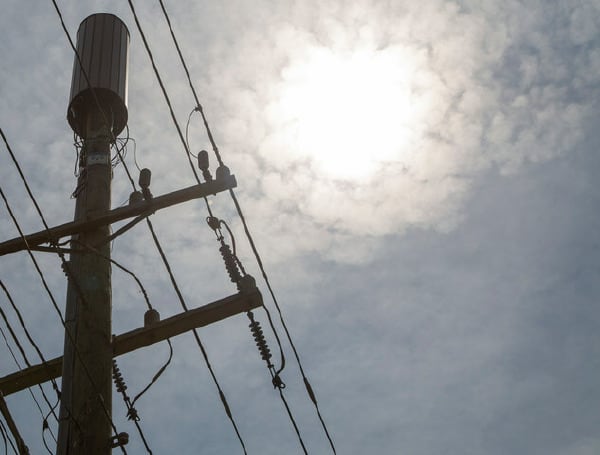Power Pole (File) By Nick Pope, DCNF. Power grid experts said Monday that the Biden administration is reportedly contemplating moving up the timel
Power grid experts said Monday that the Biden administration is reportedly contemplating moving up the timeline for part of its plan to alter the American power system. This move would likely exacerbate the potential for reliability issues.
The Environmental Protection Agency’s (EPA) May 2023 proposal would effectively require existing coal-fired power plants to reduce their greenhouse gas emissions by 90% using costly and generally unproven carbon capture and sequestration (CCS) technology, or close down by 2040.
Senior administration officials are reportedly considering moving up the retirement deadline for plants that decide against CCS installation by two years, according to Bloomberg News, a decision which could amplify existing concerns that the policy undermines the grid’s reliability, grid experts told the Daily Caller News Foundation.
Read: Supreme Court Extends Pause On Texas Immigration Law
The Clean Air Act gives the EPA the ability to regulate certain pollutants from stationary sources, including power plants, as long as the agency does so using the “best system of emission reduction” that is “adequately demonstrated,” according to the statute’s text.
The EPA’s proposal to cut emissions generated by power plants holds that CCS is “adequately demonstrated” and ready to drive major changes in America’s natural gas and coal power generation fleets. However, grid experts doubt that coal plant operators will be willing or able to install the technology to keep their facilities open ahead of the expedited compliance deadline.
“Under the proposed rules last year, utilities had until 2030 to install CCS equipment if they wanted to operate their plants past 2040. Alternatively, coal plant operators could opt to not install CCS, run their plants less often, and agree to shut down by 2040,” Isaac Orr, a policy fellow for the Center for the American Experiment who specializes in grid-related analysis, told the DCNF. The changes being considered “appear to extend the deadline to install CCS by two years (a good thing but still an unreasonable timeline for widescale adoption) and shorten the deadline for coal plant retirements by two years,” Orr added.
Read: Defendants In Trump’s Georgia Case Seek Review Of Judge’s Decision Not To Disqualify Fani Willis
“I think even 2040 would be a heavy lift to install CCS on coal plants, but EPA is making them do it 8-10 years faster. This regulation is going to cause a lot of ‘retrofit or retire’ conversations to occur,” Orr told the DCNF.
Orr conducted his own analysis of the EPA’s proposal for the Center for the American Experiment in August 2023. He found that the policy would likely lead to significant long-term gaps between power supply and demand — or blackouts — for the millions of Americans served by the Midcontinent Independent System Operator (MISO) .
Meredith Angwin, an energy analyst and author who writes extensively about grid reliability and related policy issues, had a slightly different view.
“I would say that the plant owners would have 14 to 16 years to come into compliance, and that two years shouldn’t make much difference,” Angwin told the DCNF. Nevertheless, “requiring CCS would exacerbate reliability and resource adequacy issues,” she added.
“Companies that own power plants can’t be certain to recoup their capital expenditures. So they may well choose to shut the plant down rather than invest in CCS. Shutting these plants down will decrease reliability,” Angwin continued. “I don’t think that we should assume that most coal plants will be able to implement CCS.”
Read: Trump Makes Key Endorsement In Wyoming Senate Republican Leadership Race
Doubts about CCS technology’s readiness for prime time deployment across the American power system are not exclusive to external observers, either.
The House Oversight and Accountability Committee released internal administration documents for the proposal in late February, highlighting how several administration officials have expressed serious concerns about the costs, energy efficiency, permitting problems and actual efficacy of CCS technology and infrastructure.
“The EPA should formulate a new [best system of emissions reduction] based on technologies that are adequately demonstrated, as required by the Clean Air Act. For example, recent cancellations of carbon dioxide pipelines like the Heartland Greenway Pipeline System, supported by Navigator CO2 Ventures, raise doubts about the feasibility of CCS as part of the [best system of emissions reduction],” Travis Fisher, the director of energy and environmental policy studies at the Cato Institute, wrote in comments posted to the EPA docket for the proposal.
“Such regulatory uncertainty is par for the course when building linear infrastructure in the United States, and the EPA should amend its proposed [best system of emissions reduction] to account for that reality. In other words, CCS depends on a new pipeline network that will be too difficult to build in the timeframe proposed by the EPA to be considered part of the [best system of emissions reduction].”
Neither the EPA nor the White House responded immediately to requests for comment.
Help support the Tampa Free Press by making any small donation by clicking here.
Android Users, Click To Download The Tampa Free Press App And Never Miss A Story. Follow Us On Facebook and Twitter. Sign up for our free newsletter.

